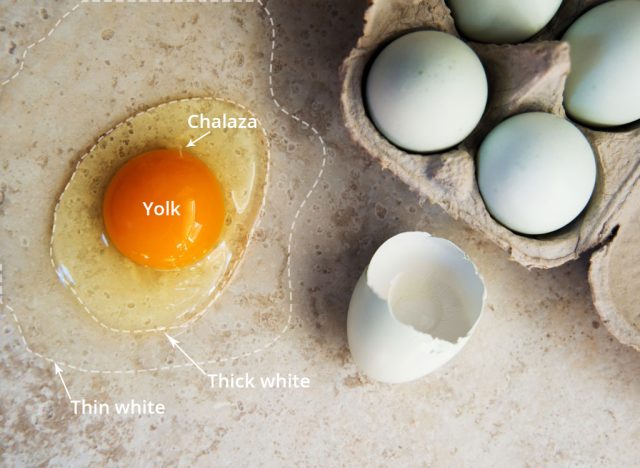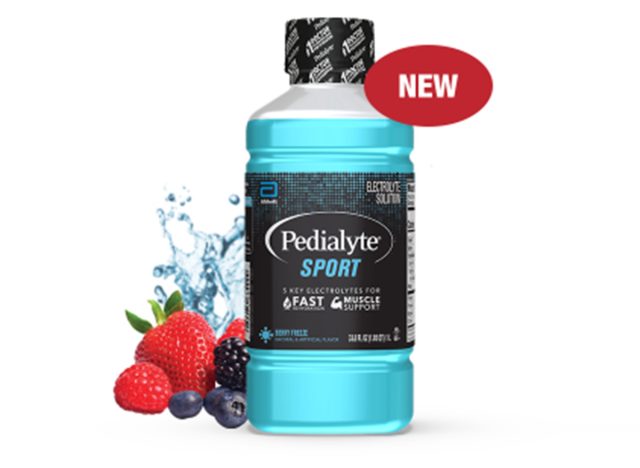Are These Common Hangover Cures Legit? From Raw Eggs to Pedialyte, Experts Weigh In

Plenty of us are probably guilty of having one of those nights—you know the ones I’m talking about. The kind of night where the voice of that little angel on your shoulder begging you to call it an early evening is drowned out by jovial bar-goers chanting, “Shots! Shots! Shots! Shots! Shots!” whether the DJ is spinning that Lil Jon record or not. Unless you decide to take a break from drinking booze or choose to abstain from drinking alcohol altogether, you might end up getting more buzzed than you initially intended if you’re not mindful of how much alcohol you’re consuming. Though this may seem fun for a night, the next day might be a whole other horror story.
One thing I’ve observed is how much the transition from lit to laying in the fetal position with a killer hangover mimics the stages of grief. There’s denial: “I’m invincible! What’s one more drink?” Anger: “I swear, if someone doesn’t make this room stop spinning, there will be hell to pay.” Bargaining: “Please god, I’ll do anything—just make this sick feeling go away.” Depression: “Why me?!” Acceptance: “That third martini was a terrible choice.” Hope—the final stage of hangover grief—is usually when you start racking your brain for any creative solution to end your hangover nightmare, especially when ibuprofen and a glass of water just aren’t cutting it. On post-party mornings when you’re nauseous and have a headache so awful it’s like an elephant is crushing your skull, you may become desperate to try any hangover cures you’ve heard of.
“We don’t fully understand what causes a hangover,” Dr. Beth McCampbell, MD, a physician at Penn Medicine Lancaster General Health, tells Eat This, Not That! “People who run marathons don’t have hangovers; not everyone who drinks gets a hangover.”
To find out which purported hangover cures may actually help alleviate uncomfortable hangover symptoms—which include but are not limited to nausea, vomiting, fatigue, headache, muscle pain, vertigo, and sensitivity to light and sound—we spoke to an RDN and MD about the efficacy of some common approaches to self-care. Keep reading to find out what they have to say about these common hangover remedies.
Tossing back a raw egg

While recently caravanning with friends to a wedding, a very chatty cab driver took it upon herself to share this interesting hangover cure recommendation: toss back a raw egg before imbibing any booze. Though the thought of swallowing a raw egg before drinking alcohol may make you want to gag and dry heave—perhaps just as much as if you were hungover right now—this suggested remedy reportedly dates back centuries. Shakespeare’s Macbeth even references serving a posset, a raw egg-forward beverage that was frequently used to treat a variety of ailments, in Act 2.
“I have heard of drinking a “prairie oyster,” which contains a [raw] egg yolk along with hot sauce, Worcheschire sauce, and other ingredients to cure a hangover,” explains Lauren Manaker, MS, RDN, LDN, CLEC, CPT, an award-winning registered dietitian, book author, recipe developer, and member of our Medical Expert Board. “Again, while there is no data showing why this works, anecdotally, people do see it help. Some lean on the cysteine amino acid as the reason why this works, as it may play a role in alcohol metabolism.”
“I would be weary of eating a raw egg, especially if it is not pasteurized, as you may be stuck with a hangover plus foodborne illness if you are not so lucky,” Manaker warns. “I would imagine people could get the same potential benefits from eating cooked eggs instead of raw.”
“I can’t think of any basis for it,” adds Dr. McCampbell. “But considering the risk of salmonella—don’t be Rocky.”
Popping an NAC supplement
In addition to boosting motivation and improving performance, n-acetyl-cysteine (NAC) supplements have also been studied within the context of hangover cure efficacy. According to a randomized trial conducted by Scientific Reports, taking NAC supplements prior to drinking alcohol helped to alleviate hangover symptoms, particularly nausea and physical weakness, in its participants, with a higher reported rate of symptom improvement with female participants. Although the reasoning for why NAC supplements were more effective for women than men could not be determined, researchers claim that no “serious adverse side effects” were reported by participants, and the few side effects that did arise were considered “mild.”
“NAC is a precursor to glutathione, an antioxidant that helps the body break down alcohol,” says Manaker. “So, NAC may help reduce the formation of toxic metabolites created when large amounts of alcohol are ingested.”
“This supplement can be useful because it’s an antioxidant, and drinking throws off your oxidative balance,” explains Dr. McCampbell. “However, there are side effects [to taking NAC], including decreased clotting ability.”
“Data showing the direct benefit between NAC and hangover is weak and sparse,” adds Manaker. “But as long as your healthcare provider is OK with you taking NAC, it will likely be safe to try taking it before drinking.”
Taking a shot of olive oil or a spoonful of sunflower oil
I admittedly first heard about this hangover treatment method in an episode of the Real Housewives of Miami. Though being an aficionado of alcohol seems to come with the territory of being a Bravolebrity (we all remember Andy Cohen’s drunken rant while cohosting CNN’s New Year’s Eve Live with Anderson Cooper last year), I still questioned the validity of this preemptive attempt to stop a hangover before it starts. However, upon further research, I discovered that having a bit of olive oil or sunflower oil straight up ahead of cocktail hour has been touted as a popular hangover cure in Greece, Italy, Spain, Turkey, and Russia for years. But is this hangover cure actually effective?
“While there is no data that I am aware of that shows the effectiveness of this method, it comes with very little downside (if any),” says Manaker. “The fat may help slow the absorption of alcohol into the bloodstream, slowing the effects of this drink that can lead to a hangover. But it doesn’t prevent the absorption of alcohol, and it can’t prevent a hangover altogether if you ingest large quantities of alcohol.”
“The mechanism of action would probably be to coat the stomach to decrease absorption of alcohol,” explains Dr. McCampbell. “I’m not sure why those oils specifically, but it’s probably because these are generally healthier fats. […] On the other hand, fat intake makes you feel fuller, so it could make you eat less—and then you might get drunk faster. Other side effects [to this hangover treatment approach] would be mostly related to excessive use [of oil]—acne, gallstones, allergic reactions, etc.”
Chugging a hydration multiplier
Hydration multipliers, like Liquid I.V., leverage a combination of sodium and glucose to transport water throughout your body faster than if you were to drink plain water sans multiplier. Designed to address dehydration across the board, some say these little packets may also come in handy to help with hangover symptoms.
“One of the reasons people feel so terrible after drinking is because of dehydration. The body’s cells require certain electrolytes to allow for fluid to enter cells and [let them become] adequately hydrated,” says Manaker. “Doing all that you can before drinking alcohol to prevent dehydration is a good step toward feeling OK the next day. So, while drinking these remedies won’t be a magic bullet to being hangover-free, using them can help prevent dehydration and the unsavory feelings that go with that.”
Though many have suggested taking a hydration multiplier before drinking copious amounts of alcohol, according to Dr. McCampbell, the jury is still out if doing so is more optimal for your health versus taking one after drinking.
“[Hydration multipliers] would probably work better the day after, as opposed to before drinking. If you take it when you’re not dehydrated, you could overhydrate, which can result in electrolyte imbalances that can be fatal,” warns Dr. McCampbell.
Pulling out the Pedialyte

Though marketed as a kids’ product, drinking Pedialyte or having a Pedialyte Freezer Pop might be able to help overserved adults nurse their hangovers with a replenishing rush of electrolytes.
“Pedialyte can help people rehydrate their bodies, thanks to the electrolytes and glucose found in these products. They are convenient and they taste good, too,” says Manaker. “While they won’t leave people feeling hangover-free, they may help them feel a bit better by helping them avoid feelings associated with dehydration.”
“Since drinking alcohol is so dehydrating, maintaining hydration is probably the best thing people can do. […] Using a rehydration solution like Liquid I.V. or Pedialyte can be a viable solution, and using them comes with very little risk (if any), especially if the additional sodium is needed,” adds Manaker.
However, Dr. McCampbell notes that only focusing on your dehydration when hungover may also pose some risk to your health.
“The problem with a lot of hangover treatments is they are based on treating dehydration—and that is not the only reason you have a hangover,” explains Dr. McCampbell. “Products that offer electrolytes or rapid hydration can give you higher than recommended daily amounts of vitamins or electrolytes.”
“There is a standard IV fluid bag that hospitals use for detoxing alcoholics called a ‘banana bag.’ The assumption there is that alcoholics are chronically missing certain electrolytes and micronutrients that would need to be replenished,” Dr. McCampbell continues. “However, that is not the case in the casual drinker, so there is a risk of giving too much of something someone didn’t need in the first place.”
So, what is the best way to treat a hangover?
“The simple act of drinking a glass of water in between alcoholic drinks can be an effective way to ensure the body has enough fluids for many people,” says Manaker. “The best way to avoid a hangover is to avoid overdrinking in the first place—and as boring as this recommendation is, it is my go-to. Otherwise, there is no surefire way to prevent a hangover from happening. I would encourage people to explore starting their drinking experience well-hydrated, and ending their adventure with a hydration solution as well if they are not drinking non-alcoholic fluids along with their alcoholic beverages. Avoiding drinking on an empty stomach is important, as well.”
Dr. McCampbell concurs. “The best way to treat a hangover is prevention: Don’t drink that much, eat before you start drinking to slow down alcohol absorption, and drink one glass of water for every glass of alcohol you drink,” she advises.